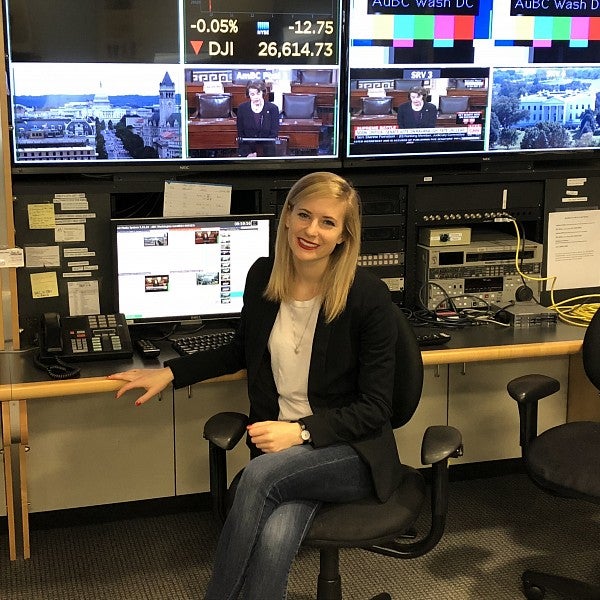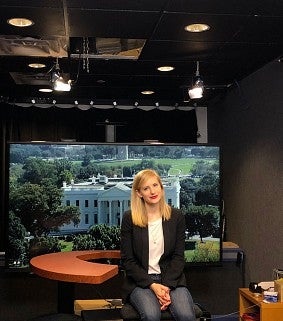
Story by Jeff Collet
Ever since Emily Olson, MS ’17, found her calling as a journalist, there’s been no stopping her. During her year in the UO School of Journalism and Communication’s Journalism Master’s program, she worked as associate news editor for Emerald Media Group, editor-in-chief of Flux magazine and reporting intern at the East Oregonian through the Charles Snowden Program for Excellence in Journalism.
All that hands-on learning helped her quickly find work post-graduation. After graduating in September 2017, Olson was hired for two consecutive positions at National Public Radio (NPR) — first as an audience relations intern and then as a marketing associate. In May 2018, she landed an internship at the North American Bureau of the Australian Broadcasting Corporation, where she is now a full-time digital producer and journalist.
We sat down with the recent graduate to find out how her studies in the SOJC’s Journalism Master’s program prepared her to take the journalism world by storm.
Tell us about your new role at the Australian Broadcasting Corporation.
The ABC is like the BBC with different accents. It’s public broadcasting, so our journalists do everything from 30-second radio newscasts to hour-long television documentaries.
Given the size of our team — three correspondents, two cameramen, two producers — the amount of work we publish is astounding. Producing in that context feels a lot like air-traffic controlling. There’s a lot going on at once, and you can’t drop the ball.

Journalism is one of those strange professions in which the goal is universal: Tell stories that matter, and tell them well. My long-term goal is pretty much that.
Short-term, I’m grappling with where I fit in this industry. I’m trying to be patient in this initial stage of my career, using these first steps to learn about myself and media. I’m asking questions like: Is there a subject I’m uniquely positioned to cover? What kind of stories will matter most to tomorrow’s audiences? What media and outlets are here to stay? And, equally important, what do I want my personal life to look like? What makes me happiest?
Why did you want to earn a master’s degree in journalism, and why did you choose the SOJC to pursue your graduate studies?
I finished my undergrad [in English from University of the Pacific] feeling like I wasn’t done learning. I wanted a fresher, nonfiction means of examining the world. Journalism fit the bill.
Oregon struck me as an interesting setting because of the geopolitical divides and industrial voids. The state contains a million microcosms for national issues.
The SOJC attracted me for its mix of classes and freedom to explore. I was sure I liked to write; I wasn’t sure if I’d enjoy producing audio or video. On a purely logistical level, the program’s one-year length made it financially achievable.
Tell us about your time as a reporting intern with the East Oregonian through the Charles Snowden Program for Excellence in Journalism.
The program is totally authentic. You’re a real reporter in a real community, with real responsibility and real consequences. I’m still realizing just how deeply that internship impacted me, but there are two things I keep coming back to: First, I learned how to report and write on a tight deadline. Second, it was hard for me, a girl from Los Angeles, to walk around Pendleton, Oregon, a total cowboy town, without feeling like an outsider. Now that I’m reporting on an international scale, I’m so glad I had that experience early on. I can be confident in inherently uncomfortable situations, able to admit my ignorance and ask the questions that matter.
What advice do you have for folks who are thinking they might want to pursue a graduate degree at the SOJC?
Pursuing a graduate degree is an awesome privilege. To go into a graduate program with a rigid path or a closed mind is to miss the point. Be entirely in the present. Respect your interests. Try new things. Be patient.
You’re also a member of the steering committee for Gather, the SOJC Agora Journalism Center’s community platform for engaged journalists. What is your view on engaged journalism and its role in the industry?
The term “community engagement journalism” is this big, nebulous, indefinable thing. But with trust in the media at an all-time low, journalism can’t afford to stay stagnant. I’ve encountered so many journalists with attitudes antithetical to the industry’s survival. It’s on us to take a lion’s share of the work in educating and welcoming new audiences. It’s about building a narrative with a community rather than dictating it to them.
I’ve found the Gather community to be an incredible source of inspiration and innovation. I don’t think we’ve solved journalism’s problems yet, but it’s important that there’s a space dedicated to surfacing those problems and giving them some thought. Every journalist — no matter the stage of their career — should check it out.
What story you’ve reported on has had the biggest impact on you and your career?
There’s a project I worked on in grad school, under the late Alex Tizon — a super ambitious piece about remnants of the “American dream” manifested in the local indie movie scene, full of pretty prose and imaginative scenes. But I didn’t know my characters well enough, and I hadn’t done sufficient research. The whole thing flopped. It was awful to the point that Tizon sat me down and said he doubted whether I truly wanted to be a journalist.
I think about that story, and about Tizon, at least twice a week. He passed away before I could show him my updated draft, and I’m too disappointed in myself to go back and read it. But I’m 100 percent certain I’ll never under-report a piece again. And every time I take a big risk in my career, I think about Tizon’s doubts and work a little harder.
Jeff Collet is in his second year as a graduate student in the SOJC’s Portland-based Multimedia Journalism Master’s program. He has been a content creator for the SOJC Communication Office in Portland since November 2017. Jeff studied visual communication design as an undergraduate at Western Oregon University. Prior to that, he served over nine years in the U.S. Army and Army Reserves as a combat photographer/videographer and multimedia illustrator. See more of his work at jeffcollet.com and follow him on Instagram @colletasyouseeit.
